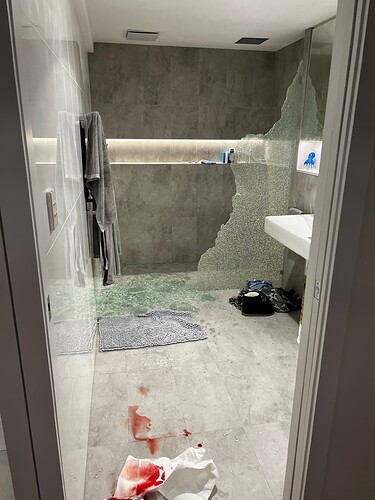Exactly same thing happened to us on 14 Feb - screen installed late 2018.
This just happened to us last night except my son was in the shower at the time. Just in surgery now fixing to deep cuts to his fingers. Stitches in foot and a few other cuts over his body. So scary he wasn’t seriously injured.
Thanks for sharing in this topic @Kazziekaz1 and welcome to the Community.
That is nasty. Hope all is OK with your lad.
By the nature of the failure it’s typical of a panel of heat treated/tempered glass.
Are you able to confirm if possible the glass panel thickness and whether it had any applicable Australian Standard marking prior to failure, AS/NZS 1288 and 2208?
More serious examples of similar failures include glass panels used for balcony balustrades.
Suggestions for Choice:
It looks to be a useful project for Choice to research the frequency of failures of frameless glass panels used internally (showers, stairways, landings etc) and externally for balustrades (height protection) and pool safety fencing. @BrendanMays. Appreciate the suggestion is challenging a multi million dollar industry and others will take exception to questioning architectural perfection.
Clearly the industry has/had concerns. (2019)
The consumer challenge is that the industry, Standards Australia and Building Regulators have accepted specifications for what they often refer to as ‘Grade A’ safety glass. The outcome is not without risk, considering failures are occurring.
The glass panels can fail due to manufacturing defect, poor quality of installation, or force greater than design. My detailed knowledge is limited. One possible interpretation is the industry has a problem with the first two, and so long as it recognises those it is still ok to promote the product knowing the standards/building codes accept glass panels are safe. IE meet minimum strength and loading requirements, and if heat treated/tempered fail by shattering into pebble sized shards. Of course the second outcome can cause personal injury, by proximity, glass falling from above, or creating a fall risk.
A further point of research Choice might consider is the public statements made in the promotion of the glass panels by retailers/suppliers. Searching for reasons for panel failure - one explanation offered by installers appears to shift the unexplained to microscopic inclusions, (defects trapped during manufacture for creating residual stress fractures). IE a quality issue they have no control over, but no cause for concern as they only use ‘Grade A’ safety glass to AS…. Implied is if the glass fails the outcome should not be a concern. The glass is standards approved. ![]()
P.S.
I’ve edited the topic title to include future discussion of the broader use of heat treated/toughened safety glass panels around the home.
That’s a bad one @Kazziekaz1, I hope your son is okay and wish him a speedy recovery. I’ll highlight this case to my colleagues working in product safety.
Hi Mark, the glass was made to Australian Standards code as/nzs 2208:1996 safety glazing materials in buildings.
Thanks Brendan. My son now in a cast for 4-6 weeks after surgery revealed the glass had cut through 90% of his tendon in his middle finger.
Thanks Gregr.
The Pilkington article is interesting in that it covers various possible reasons for failure but doesn’t really come to any firm conclusions. It says of impact damage:
This can often lead to the misconception of ‘spontaneous fracture’.
However it isn’t clear if there are other possible causes for ‘spontaneous fracture’ or if it is accepted that it happens at all. Conceptually I think that (at the macro level at least) things don’t just happen for no reason.
I am also aware that any time anything is broken in the vicinity of young males the most likely perpetrator will be “not me”.
Still I have to wonder if this isn’t a bit of misdirection. The thought that we have no clear idea why this happens and how to reliably prevent it must be unnerving at least to vendors.
Building Commissioner Peter Gow says safety/toughened glass is safe and any injuries from it can be serious but not life threatening, like injuries from ordinary glass.
“It’s a very rare occurrence; this tempered glass is used for a range of things,” Mr Gow said.
“It very rarely explodes; if it does it’s either a manufacturing defect or it’s been damaged a little bit in installation or transport.”
It’s likely there will be differing reactions within the community to the above statements, made in 2017. They are not unique. Looking to industry comment on other instances they follow a similar line.
My suggestion that Choice might look to the issue is a concern consumers don’t know the full extent of the problem or risk.
What ever the reasons in each instance of a reported failure there are some such as quality of manufacturing, transport and handling consumers have no control over. If there are others that relate to how consumers maintain their homes, accidental impact etc, it would be prudent consumers are made aware of the risks, and how to safely maintain the use of these panels around the home.
Cynically it is to the advantage of the industry to ensure consumers cannot with any certainty attribute a failure of a panel to any one factor. EG manufacturing defect, installation fault, supplier transport and QA deficiencies. If a consumer could, it would open litigation for the losses, and in the instance of injuries greater claims.
It’s made all the more difficult to challenge due to the Standards Australia and building regulators certification of the type of product. My take on this is neither Standards Australia nor the Government bodies responsible for regulation within the industry take responsibility for the quality of the product manufactured. They will only after the event respond, firstly to industry need, and only reluctantly to consumer concerns, IMO.
